(RICHMOND, VA.) — While Donald J. Trump may no longer hold the presidency, his influence remains strong among his base, which includes millions of American voters, even as he grapples with numerous felony indictments. Trump’s prowess in shaping narratives has fostered a post-truth subculture, challenging the ideals America strives to embody. This era is characterized by accusations of high treason and dismissals of critical media as “fake news,” raising a crucial question: How should newsrooms handle coverage of a figure like Trump, known for his disregard for truth?
The precedent for Trump’s relationship with the truth was established early in his presidency. Sean Spicer, in his first appearance as White House press secretary, falsely claimed that Trump’s inauguration drew the largest crowd ever. This seemingly minor falsehood foreshadowed a presidency riddled with misrepresentations, where the president prioritized loyalty over factual accuracy. This sentiment was reinforced by Kellyanne Conway, Trump’s counselor at the time, who coined the term “alternative facts” during a “Meet the Press” interview on Jan. 22, 2017. This phrase became emblematic of the administration’s casual approach to truth distortion.
Even well-intentioned Americans can fall victim to unreliable news sources, from social media-shared memes to altered videos and fake websites. Jamais Cascio of the Pew Research Center observed in 2017, a sentiment still relevant in 2023: “The crisis we face about ‘truth’ and reliable facts is less about getting people to believe the wrong thing as it is about getting them to doubt the right thing.” Cascio warned that the goal of this trend was not only to spread falsehoods but to sow doubt about what is true. Alarmingly, Trump’s success in creating a self-serving, dishonest narrative has misinformed and confused many Americans.
Margaret Sullivan, a former Washington Post media columnist, suggests a shift in journalistic approach: “When covering politicians who fundamentally oppose democracy, traditional journalism falls short.” To remain relevant in a media landscape fraught with distortion, journalists must adhere to principles of fairness and rigorous reporting.
Gone are the days of reporting every Trump tweet. As we approach the 2024 election, journalists must navigate a terrain of untruths and platitudes from Trump, deciding what is genuinely newsworthy. This involves a commitment to truth, ethics, and a steadfast dedication to informing the public, free from bias or ridicule, especially when confronting figures who consistently distort reality. Philip Rucker, deputy national editor of The Washington Post, echoes this sentiment: “We will cover a Trump campaign the same way we cover every other presidential campaign.”
Now, with Trump embroiled in scandal and legal trouble, it’s vital for journalists to counter his misleading statements without succumbing to ridicule or bias. While debunking his claims might not convert his most dedicated followers, journalists must relay information factually and ethically, not only for the profession but for the country.


